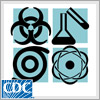
Listen to/view CDC podcasts on your computer or download them for reliable health
and safety information when and where you want it. New to podcasting? See
Podcast Help and RSS Help
Deployment Health: Family and Child Issues

This podcast is an overview of the Clinician Outreach and Communication Activity (COCA) Call, "Impact of Deployment on the Health of Service Members and Their Families – Why Clinicians Should Ask." CDC's Dr. Ruth Perou discusses the mental and behavioral health effects of deployment on children and families. Created: 10/1/2010 by National Center on Birth Defects and Developmental Disabilities (NCBDDD) and Emergency Communication System (ECS)/Joint Information Center (JIC); Office of Public Health Preparedness and Response (OPHPR). Date Released: 10/6/2010. Series Name: COCA Commentary.
Press Play to listen to this CDC Podcast
Running time = 3:17
To save the Podcast, right click the "Save this file" link below and select the
"Save Target As..." option.
How are we
doing?
Podcasting Resources
Contact Us:
- Centers for Disease Control and Prevention
1600 Clifton Rd
Atlanta, GA 30333 - 800-CDC-INFO
(800-232-4636)
TTY: (888) 232-6348 - Contact CDC–INFO

